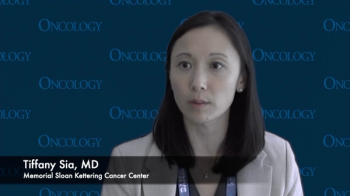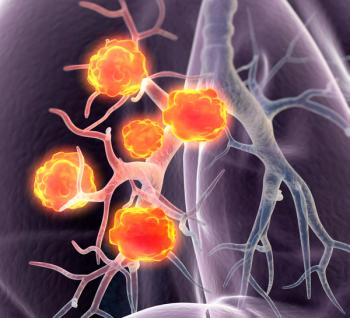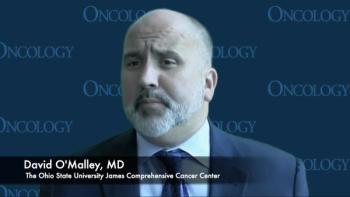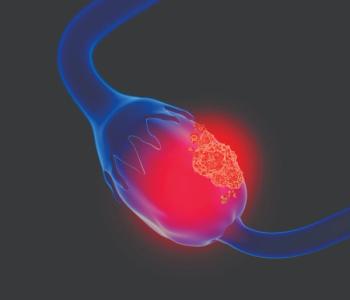
Receipt of red blood cell transfusions can negatively impact survival outcomes in patients with endometrial cancers, while ovarian cancers were most affected by preoperative global health status.

Your AI-Trained Oncology Knowledge Connection!


Receipt of red blood cell transfusions can negatively impact survival outcomes in patients with endometrial cancers, while ovarian cancers were most affected by preoperative global health status.

Patients with locally advanced or metastatic EGFR-mutant nonsquamous non–small cell lung cancer who progressed on an EGFR inhibitor may benefit from treatment with sintilimab plus bevacizumab biosimilar IBI305 and chemotherapy vs chemotherapy alone.

Data from a pivotal phase 3 trial support a recent biologics license application for denileukin diftitox that was submitted to the FDA.

CancerNetwork spoke with AmerisourceBergen's Lisa Harrison, RPh, about how the new Enhancing Oncology Model and medically integrated dispensing factor into combating health disparities.

Tiffany Sia, MD, spoke about major takeaways from her study and how to implement procedural interventions for patients with gynecologic malignancies who have oligoprogression.

Patients with locally advanced/metastatic non–clear cell renal cell carcinoma experienced promising preliminary antitumor activity following treatment with pembrolizumab and lenvatinib in the first line.

The phase 3 TALAPRO-2 study met the primary end point of radiographic progression-free survival in patients with metastatic castration-resistant prostate cancer with or without homologous recombination repair gene mutations following treatment with a combination of talazoparib and enzalutamide.

A secondary end point analysis of the phase 2 TUXEDO-1 trial found that trastuzumab deruxtecan improved outcomes without significantly impacting quality of life for patients with HER2-positive breast cancer with CNS metastases.

Investigators believe that disease modifying agents may demonstrate benefit in patients with myeloproliferative neoplasms prior to allogeneic hematopoietic cell transplant.

CUE-101 alone or in combination with pembrolizumab was granted fast track designation by the FDA for patients with human papillomavirus 16–positive recurrent/metastatic head and neck squamous cell carcinoma.

Fast track designation was granted to sapanisertib by the FDA for patients with unresectable or metastatic squamous cell non–small cell lung cancer who have an NRF2 mutation.

A recent study presented at IGCS 2022 looking at clinical trial enrollment found that Black patients experienced the biggest increase in accrual following an NCI call-to-action for more diversity in clinical trials.

Results from a phase 2 trial indicated that atezolizumab and bevacizumab yielded a significant duration of response in recurrent endometrial cancer.

Despite inconclusive efficacy results regarding the use of pembrolizumab plus epacadostat in patients with recurrent clear cell ovarian carcinoma, rapid accrual to the trial reveals an unmet need in this cancer subset.

Results from the phase 3 TRITON3 trial demonstrated that radiographic progression-free survival was significantly improved when patients with metastatic castration-resistant prostate cancer were treated with rucaparib monotherapy vs physician’s choice.

A real-world study found that time to discontinuation and time to next treatment outcomes associated with ibrutinib were not impacted by a baseline high risk of atrial fibrillation or stroke in patients with chronic lymphocytic leukemia or small cell lymphocytic lymphoma.

A recent analysis of data from the phase 3 PEACE-1 study reveals a correlation between 8-month prostate-specific antigen levels and survival outcomes in patients with metastatic castration-sensitive prostate cancer who are treated with systemic therapy regimens that include androgen deprivation therapy.

Based on results from a phase 3 trial, a bevacizumab biosimilar, bevacizumab-adcd, was approved by the FDA for patients with metastatic or recurrent non-squamous non–small cell lung in addition to 5 other disease types.

Japan’s Ministry of Health, Labor and Welfare approved pembrolizumab for use in 4 indications, including high-risk, early-stage triple-negative breast cancer, stage IIB or IIC melanoma, adjuvant renal cell carcinoma, and recurrent/metastatic cervical cancer.

Data from the phase 3 ATHENA-MONO study indicated that maintenance rucaparib yielded progression-free survival benefit vs placebo across all subgroups in a population of patients newly diagnosed ovarian cancer, according to David O’Malley, MD.

Treatment with gavocabtagene autoleucel demonstrated efficacy and tolerability in patients with mesothelin-expressing solid tumors, according to updated data from an ongoing phase 1/2 clinical trial.

Results from the phase 1/2 TAS-120-101 trial lead to the accelerated approval of futibatinib in patients with locally advanced or metastatic cholangiocarcinoma and an FGFR2 gene fusion or rearrangement.

Patient-reported outcome data from the phase 3b OReO/ENGOT-ov38 trial showed no significant effect on quality of life following rechallenge with maintenance olaparib in patients with platinum-sensitive relapsed ovarian cancer.

At 2022 IGCS, Tiffany Sia, MD, spoke about using procedural interventions to treat patients with gynecologic malignancies who have oligoprogression on treatment with immune checkpoint inhibitors.

Results from the phase 3 ATHENA-MONO study suggest that rucaparib could serve as a promising first-line maintenance treatment option in newly diagnosed ovarian cancer.

Patients with mismatch repair deficient, microsatellite instability–high advanced/recurrent endometrial cancer may derive benefit from treatment with dostarlimab-gxly.

Results from the phase 3 CALLA trial indicated that durvalumab in combination with chemoradiotherapy did not yield a meaningful improvement in progression-free survival compared with chemoradiotherapy alone in high-risk locally advanced cervical cancer.

Results from the phase 2 IMMUCHEC trial indicated that tremelimumab with or without durvalumab did not meet the primary end point of improved objective response rate vs chemotherapy in patients with treatment-naïve biliary tract cancer.

Results from a Korean study presented at 2022 IGCS showed that the level of CA-125 at different timepoints during neoadjuvant chemotherapy may help clinicians decide which patients with high-grade serous ovarian cancer should undergo interval debulking surgery.

FORE8394, which received fast track designation by the FDA, is under ongoing evaluation in a phase 1/2a trial in patients with advanced solid and central nervous system tumors harboring BRAF alterations.